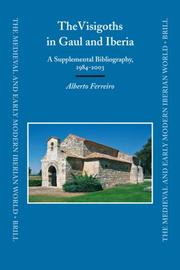| Listing 1 - 5 of 5 |
Sort by
|

ISBN: 900414594X 9789004145948 9786611396725 1281396729 9047408187 9789047408185 6611396721 9781281396723 Year: 2006 Volume: 28 Publisher: Leiden Boston E.J. Brill
Abstract | Keywords | Export | Availability | Bookmark
 Loading...
Loading...Choose an application
- Reference Manager
- EndNote
- RefWorks (Direct export to RefWorks)
The bibliography includes material published from 1984 to 2003. The historical chronology has been expanded to include the fourth century. This includes unlike the first one Iberian Fathers such as Gregory of Elvira, Potamius of Lisboa, Prudentius, and Pacian of Barcelona. As with the first bibliography (Brill, 1988) among the many topics represented are: Archaeology, Liturgy, Monasticism, Iberian-Gallic Patristics, Paleography, Linguistics, Germanic and Muslim Invasions, and more. In addition, peoples such as the Vandals, Sueves, Basques, Alans and Byzantines are included. The book contains author and subject indexes and is extensively cross-indexed for easy consultation. A periodicals index of hundreds of journals accompanies the volume. This collection of nearly 8,000 entries is an attempt to bring up-to-date the scholarship on Iberia and Gaul in Late Antiquity.
Visigoths --- Wisigoths --- Bibliography. --- Bibliographie --- Visigoths. --- West-Goten. --- Westgoten. --- Westgotenreich. --- Geschichte --- France. --- Spain. --- Gallië. --- Iberisch schiereiland. --- Gallien. --- Spanien. --- Geschichte. --- West Goths --- Goths
Book
ISBN: 9048551064 9463720634 Year: 2020 Publisher: Amsterdam : Amsterdam University Press,
Abstract | Keywords | Export | Availability | Bookmark
 Loading...
Loading...Choose an application
- Reference Manager
- EndNote
- RefWorks (Direct export to RefWorks)
How did the breakdown of Roman rule in the Iberian peninsula eventually result in the formation of a Visigothic kingdom with authority centralised in Toledo? This collection of essays challenges the view that local powers were straightforwardly subjugated to the expanding central power of the monarchy. Rather than interpret countervailing events as mere 'delays' in this inevitable process, the contributors to this book interrogate these moments to uncover the hidden agency of individuals and local authorities. What emerges is a story of contested interests seeking cooperation through institutions and social practices that were flexible enough to stabilise a system that was hierarchical yet mutually beneficial for multiple social groups. By examining the Visigothic settlement, the interplay between central and local power, the use of ethnic identity, projections of authority, and the role of the Church, this book articulates a model for understanding the formation of a large and important early medieval kingdom. Bron: Flaptekst, uitgeversinformatie.
Iberisch Schiereiland. --- Germanen. --- Political science. --- Spain --- History --- Administration --- Civil government --- Commonwealth, The --- Government --- Political theory --- Political thought --- Politics --- Science, Political --- Social sciences --- State, The --- Visigoths, Iberian Peninsula, Late Antiquity, Early Middle Ages, Toledo.
Book
ISBN: 9780812209174 0812244915 0812209176 1322512833 9780812244915 Year: 2013 Publisher: Philadelphia
Abstract | Keywords | Export | Availability | Bookmark
 Loading...
Loading...Choose an application
- Reference Manager
- EndNote
- RefWorks (Direct export to RefWorks)
The enslaved population of medieval Iberia composed only a small percentage of the general populace at any given point, and slave labor was not essential to the regional economy during the period. Yet slaves were present in Iberia from the beginning of recorded history until the early modern era, and the regulations and norms for slavery and servitude shifted as time passed and kingdoms rose and fell. The Romans brought their imperially sanctioned forms of slavery to the Iberian peninsula, and these were adapted by successive Christian kingdoms during the Middle Ages. The Muslim conquest of Iberia introduced new ideas about slavery and effected an increase in slave trade. During the later Middle Ages and the early modern period, slave owners in Christian Spain and Portugal maintained slaves at home, frequently captives taken in wars and sea raids, and exported their slave systems to colonies across the Atlantic. Slavery in Medieval and Early Modern Iberia provides a magisterial survey of the many forms of bound labor in Iberia from ancient times to the decline of slavery in the eighteenth century. William D. Phillips, Jr., examines the pecuniary and legal terms of slavery from purchase to manumission. He pays particular attention to the conditions of life for the enslaved, which, in a religiously diverse society, differed greatly for Muslims and Christians as well as for men and women. This sweeping narrative will become the definitive account of slavery in a place and period that deeply influenced the forms of forced servitude that shaped the New World.
Slavery --- Abolition of slavery --- Antislavery --- Enslavement --- Mui tsai --- Ownership of slaves --- Servitude --- Slave keeping --- Slave system --- Slaveholding --- Thralldom --- Crimes against humanity --- Serfdom --- Slaveholders --- Slaves --- History --- Esclavage --- Histoire --- 15.70 history of Europe. --- Sklaverei. --- Slavery. --- Slaves. --- To 1599. --- Europe --- Iberisch schiereiland. --- Iberische Halbinsel. --- Enslaved persons --- Persons --- History. --- European History. --- Medieval and Renaissance Studies. --- World History.

ISBN: 3406301525 9783406301520 Year: 1984 Volume: 36 Publisher: München Beck
Abstract | Keywords | Export | Availability | Bookmark
 Loading...
Loading...Choose an application
- Reference Manager
- EndNote
- RefWorks (Direct export to RefWorks)
Municipal corporations (Roman law) --- Municipes --- Lex Malacitana --- Malaga (Spain) --- Charters, grants, privileges --- Chartes, privilèges, immunités --- Málaga (Spain) --- -Charters, grants, privileges --- Chartes, privilèges, immunités --- Roman law --- Lex Malacitana. --- Lex Malac. --- Lex Municipii Malacitani --- Mālaqah (Spain) --- Charters, grants, privileges. --- Steden. Rome (Oud-). Iberisch schiereiland. --- Lex municipii Malacitani. --- Malaya. Geschiedenis. 1e eeuw. Bronnen. --- Municipes. Espagne. --- Villes. Rome ancienne. Ibérique (Péninsule). --- Malaya. Histoire. 1er s. Sources. --- Municipia. Spanje.
Book

ISBN: 9782503504704 2503504701 Year: 2012 Volume: 12 Publisher: Turnhout : Brepols,
Abstract | Keywords | Export | Availability | Bookmark
 Loading...
Loading...Choose an application
- Reference Manager
- EndNote
- RefWorks (Direct export to RefWorks)
Avant 1500 --- 091:860 --- 869.0 --- 091 =60 --- 091 =690 --- Handschriftenkunde. Handschriftencatalogi-:-Spaanse literatuur --- Portugese literatuur --- Handschriftenkunde. Handschriftencatalogi--Spaans --- Handschriftenkunde. Handschriftencatalogi--Portugees --- Language Spanish language variations --- Portugees. --- Dialecten. --- Iberisch schiereiland. --- 091 =690 Handschriftenkunde. Handschriftencatalogi--Portugees --- 091 =60 Handschriftenkunde. Handschriftencatalogi--Spaans --- 869.0 Portugese literatuur --- 091:860 Handschriftenkunde. Handschriftencatalogi-:-Spaanse literatuur --- 467 --- Middeleeuwen. --- Spaans. --- Spanish language --- Portuguese language --- Espagnol (Langue) --- Portugais (Langue) --- History --- To 1500 --- Dialects --- Spanish literature --- History and criticism --- Portuguese literature --- Galician language --- Iberian peninsula --- Languages --- Texts --- Espagnol (langue) --- Galicien (langue) --- Portugais (langue) --- Littérature espagnole --- Littérature portugaise --- Dialectes
| Listing 1 - 5 of 5 |
Sort by
|

 Search
Search Feedback
Feedback About UniCat
About UniCat  Help
Help News
News